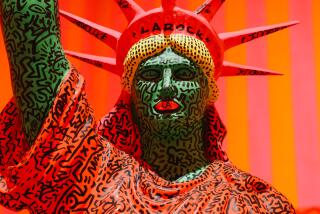POP MUSIC REVIEW : Jules Shear’s Craft Shines in Tunes, Not Presentation
- Share via
Jules Shear is a power-pop hall of famer. The longtime cult hero, who headlined the Troubadour on Tuesday, mines a wealth of classic ‘60s pop devices, creating a world where taut, throbbing verses, soaring choruses and arching bridges trace the contours of emotional ups and downs (in Shear’s case, mainly downs).
He’s an uncommonly sophisticated craftsman in the style, fashioning hooks that have substance as well as catchiness and bringing an elegance to sound that’s often simplistic. This touch has made him a regular supplier of hits for a varied roster of acts, from the Bangles to Cyndi Lauper to Alison Moyet.
His own career as a performer has been spotty, and his Troubadour set showed some reasons why. His singing is rough but earnest, with a tone like a nasal Jackson Browne, and he strains for the levels of expression his songs demand.
Given that, the optimum Shear show would rely more on tunes powered by his three backing musicians and less on the bare, intimate selections that he dropped in throughout Tuesday’s set--though, to be fair, the emotional peak was the halting, hymn-like ballad “If We Never Meet Again,” where he transfigured the strain into an absorbing urgency.
The optimum would also dispense with songs by other writers. The Walker Brothers’ pseudo-Spector ’64 hit “The Sun Ain’t Gonna Shine Anymore” is essentially a vocal showcase, so that was a pointless exercise, and Badfinger’s “No Matter What” was an uneventful nod to his roots.
More to Read
The biggest entertainment stories
Get our big stories about Hollywood, film, television, music, arts, culture and more right in your inbox as soon as they publish.
You may occasionally receive promotional content from the Los Angeles Times.










